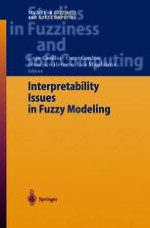2003 | OriginalPaper | Chapter
About the trade-off between accuracy and interpretability of Takagi-Sugeno models in the context of nonlinear time series forecasting
Author : Antonio Fiordaliso
Published in: Interpretability Issues in Fuzzy Modeling
Publisher: Springer Berlin Heidelberg
Included in: Professional Book Archive
Activate our intelligent search to find suitable subject content or patents.
Select sections of text to find matching patents with Artificial Intelligence. powered by
Select sections of text to find additional relevant content using AI-assisted search. powered by
The focus of this chapter is related to the question of how to find appropriate Takagi-Sugeno (TS) rules in the framework of (chaotic) time series forecasting. We propose a generalization of the conventional TS system (GTS) allowing to evaluate the importance of any rule in the inference process. The added value of this feature has been put in light on two well-known chaotic time series.Local (clustering-based) and global (gradient-based) learning strategies for GTS systems are compared in terms of interpretability and accuracy. It appears that there is an unavoidable compromise between these two objectives. Global learning seems to be superior in term of accuracy but cannot achieve the same level of interpretability as the local approach.We also present an application of the GTS model in the field of forecasts combination with the target of generating interpretable final rules. This has led us to put additional constraints in the model. More precisely, we force the local linear models (rules conclusions) to achieve convex combination of the forecasts (input patterns). The proposed system may be useful for a wide range of applications where a consensus is required, including forecasts synthesis, controllers and patterns classifiers aggregation.
